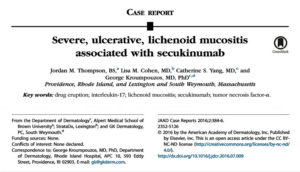Biologic Drugs: Are They Safe?
- Posted on: Sep 8 2016
Biologic drugs are considered a major advance in the treatment of psoriasis, hidradenitis and other skin disorders. They work by blocking the processes in the immune system that create the inflammation. Biologic drugs used in dermatology include Enbrel, Humira, Remicade, Rituximab, and Stelara, as well as the recently added Cosentyx and Taltz.
The initial concerns that biologic medications used in psoriasis can increase substantially the risk of life-threatening infections such as tuberculosis, cancer such as lymphoma, and neurologic disease. However, these concerns were eased by recent studies that showed a minimal risk of serious infection and cancer associated with biologic drug use in psoriasis. Nevertheless, while the short-term (i.e. 5-year) safety appears acceptable, the long-term safety of the newer biologic drugs has not been studied.
Biologic drugs have been associated with a plethora of other, less serious, manageable adverse effects, such as mucositis (inflammation and ulcerations in mouth) or blistering rashes including a reactivation of a blistering disease called bullous pemphigoid. The group of Dr. Kroumpouzos has extensively studied extensively the adverse effects of biologic drugs and authored papers in Journal of the American Academy of Dermatology Case Reports (see excerpts below).
If you are concerned that your biologic medication is causing an adverse effect, please contact your dermatologist.
Posted in: Drug Safety, Latest News, Psoriasis


